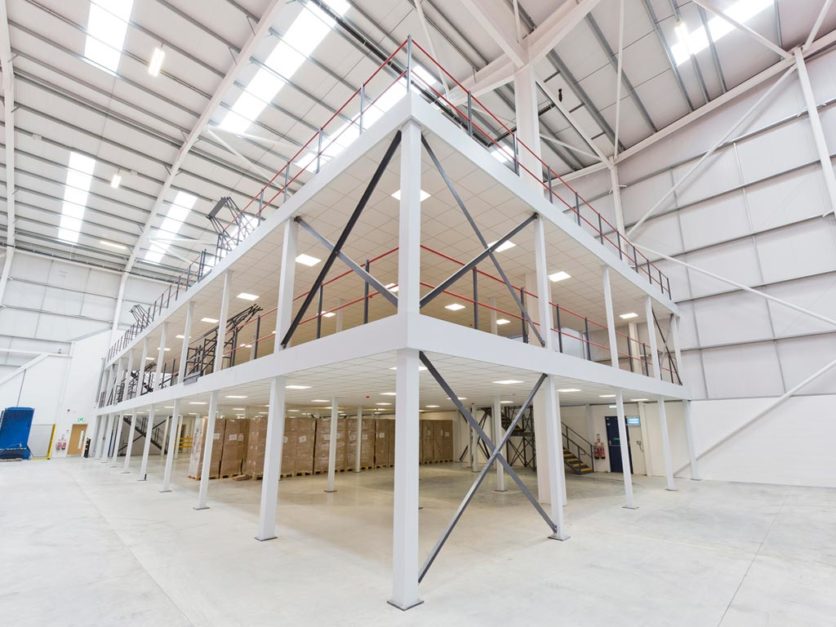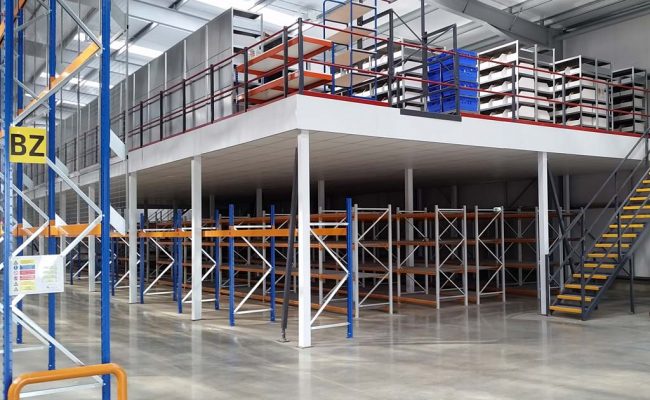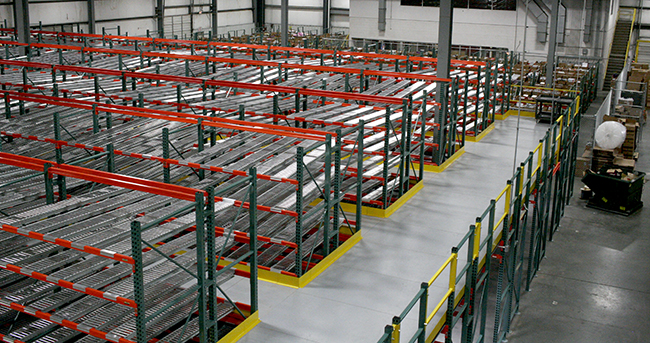When maximising the space in your commercial or industrial building, a mezzanine floor can be an excellent solution. A mezzanine floor is a raised platform supported by steel columns and beams and can be customised to suit your specific needs and preferences.
These floors are not only practical and cost-effective but also versatile and adaptable. They can be used for various purposes, such as storing goods, creating offices, displaying products, or providing extra workstations.
In this blog, Graana.com has discussed everything you need to know about mezzanine floors, including their benefits, design considerations, installation process, and more.
Types of Mezzanine Floor

Different types of mezzanine floors have differing features, benefits, and drawbacks. There are a total of five types of mezzanine floors, each with varying features and benefits.
Structural Mezzanine Floors

Structural mezzanine floors are the most common and popular type of this floor. They are made of different types of beams and columns bolted together to form a rigid and sturdy structure. These floors can span large areas without intermediate support, which maximizes the floor space and allows for easy access and movement.
These floors can also be designed to match the existing layout and aesthetics of your building, as they come in various shapes, sizes, and colours. Structural mezzanine floors are ideal for businesses that need a high load-bearing capacity and a flexible configuration.
They can support heavy equipment, machinery, and inventory, as well as accommodate changes in layout or expansion in the future. These floors are also easy to install and dismantle, as they do not require any permanent alterations to the building structure.
Rack-Supported Mezzanine Floors

Rack-supported is a type of mezzanine floor integrated with the existing racking system in your warehouse or factory. They are an extension of the racking system that creates an additional storage level above the ground floor.
Rack-supported floors use the racking uprights as the primary support columns for the mezzanine floor, eliminating the need for additional steel columns and beams. This saves on material and installation costs and optimises space utilisation.
Rack-supported floors are ideal for businesses with a high volume of palletised goods or products that need to be organised and efficiently stored.
They can increase the storage capacity and density of your warehouse or factory, as well as improve the accessibility and visibility of your inventory. These floors can also be customized to suit different racking systems, such as selective, drive-in, push-back, or carton flow racks.
Shelving-Supported Mezzanine Floors
Shelving-supported mezzanine floors are similar to rack-supported mezzanine floors except that they use shelving units instead of racking units as the main support structure for the mezzanine floor.
These mezzanine floors are suitable for businesses with a variety of small or medium-sized goods or products that need to be stored in an orderly and accessible way. They can create more storage space and work areas within your warehouse or factory and enhance the organisation and productivity of your operations.
If you want to make the most of your storage space, you might want to consider shelving-supported mezzanine floors. These are special structures that use shelving units as the support for an elevated floor. You can choose from different types of shelving systems, such as open or closed shelves, long-span shelves, cantilever shelves or mobile shelves.
Freestanding Mezzanine Floors
Imagine having a second floor in your warehouse or factory that you can move around as you please. That’s what freestanding mezzanine floors offer you. They stand on their own, without relying on any existing structure. You can place them anywhere you have space and access.
They consist of steel modules that you can easily put together or take apart. You can also change their shape or size if your needs change. Freestanding mezzanine floors give you flexibility and convenience for your storage or work area.
Freestanding mezzanine floors are ideal for businesses that need a temporary or flexible solution for creating more space or work areas in their warehouse or factory.
Multi-Tier Mezzanine Floors
Multi-tier are a type of mezzanine floor that consists of more than one level of raised platforms above the ground floor. They are a combination of two or more types of mezzanine floors stacked on top of each other.
A mezzanine is a great way to add more space and value to your home. However, it requires careful planning and preparation to meet your expectations and needs.
Installation Process
A mezzanine floor is a raised platform that creates additional space in a building. You can use these for storage, office, retail, or other purposes.
Following are the step for installing this floor:
Site Survey And Assessment
Before starting the installation, site surveys and assessments are conducted to determine the feasibility, suitability, and safety of the project.
The site survey includes measuring the available space, checking the floor load capacity, identifying any obstacles or hazards, and verifying the building regulations and fire safety requirements. The assessment also involves discussing the client’s needs, preferences, and budget.
Design And Engineering
Based on the site survey and evaluation, a design and engineering plan develops for these floor. The plan includes the layout, dimensions, materials, specifications, and structural calculations of the mezzanine floor. The plan also considers the aesthetics, functionality, and efficiency of these floors.
Fabrication and manufacturing
Once the design and engineering plan is finalised, the mezzanine floor components will be fabricated and manufactured. The components include columns, beams, joists, decking, stairs, railings, and other accessories.
Delivery And Installation
A team of qualified and experienced installers delivers and installs the mezzanine floor components to the site after completing the fabrication and manufacturing. The installation process follows the design and engineering plan and adheres to health and safety standards.
The installation involves assembling the components, securing them to the existing floor and ceiling, connecting them to the utilities, and finishing them with any required coatings or finishes.
Testing And Inspection
The final step of this floor installation process is testing and inspection. The testing involves checking this floor stability, strength, alignment, functionality, and performance. The inspection verifies that the mezzanine floor meets the design specifications, building regulations, fire safety requirements, and client expectations.
Benefits
Mezzanine floors offer several benefits for businesses that need additional space. Here are some of the main advantages:
Cost-Effective
This floor is a cost-effective solution for expanding your usable space, as they don’t require the same construction work as a major renovation or expansion.
Efficient Use Of Space
This floor allow you to use the vertical space in your building, which can be particularly useful in warehouses or industrial settings where floor space is at a premium.
Versatility
If you need more space in your building, this option can help you. You can use them for different purposes, such as storing goods, creating office space, or displaying products. You can also customise them to suit your needs.
Easy To Install
You can install this floor in your warehouse or office without wasting too much time or money. This floor adds extra space and functionality to your premises.
Designing
Designing a mezzanine floor requires careful consideration of several factors, including the intended use of the space, the building’s structural requirements, and local building codes. Here are some of the key design considerations:
Load Capacity
The load capacity of the mezzanine floor will depend on the intended use of the space. For example, a storage mezzanine will require a higher load capacity than an office mezzanine.
Materials
You can construct these floors using various materials, including wood, steel, and concrete. The choice of materials will depend on the intended use of the space and the load capacity requirements.
Stairs And Handrails
This floor requires stairs and handrails for safety reasons. You can design these to fit your needs, with options like spiral or straight stairs.
Lighting And Ventilation
Depending on the intended use of the space, you may need to consider lighting and ventilation for the mezzanine floor. You can incorporate skylights, windows, and HVAC systems.
For more information, visit Graana.com.
Read More
PVC Flooring: Overview, Pricing, Types and More
Best Waterproof Flooring Options for Your Home




